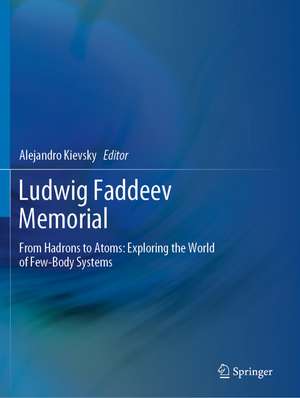Ludwig Faddeev Memorial: From Hadrons to Atoms: Exploring the World of Few-Body Systems
Editat de Alejandro Kievskyen Limba Engleză Paperback – 29 ian 2021
This issue contains the two winners of the 2018 Faddeev Medal, which was created to recognize distinguished achievements in Few-Body Physics. It is awarded every three years to a scientist who advanced the field of few-body physics significantly. In 2018 an international panel selected the winners of the 2018 award: Prof. Vitaly Efimov and Prof. Rudolf Grimm.
The contents show the deep influence of Prof. Faddeev in different fields of physics. The solutions of the Faddeev equations represented a challenge for many years and at present times from their solution theoretical models can be tested with great detail to experimental data. This has boosted thestudied of few-nucleon systems and new methods have been developed as well.
Many contributions discuss different aspects of the few-nucleon problem from a theoretical and an experimental point of view. They represent the best of our knowledge at present times.
Spin-off from Journal Few-Body Systems, Volumes 60 (2019)
| Toate formatele și edițiile | Preț | Express |
|---|---|---|
| Paperback (1) | 656.43 lei 6-8 săpt. | |
| Springer International Publishing – 29 ian 2021 | 656.43 lei 6-8 săpt. | |
| Hardback (1) | 664.61 lei 3-5 săpt. | |
| Springer International Publishing – 29 ian 2020 | 664.61 lei 3-5 săpt. |
Preț: 656.43 lei
Preț vechi: 772.26 lei
-15% Nou
Puncte Express: 985
Preț estimativ în valută:
125.61€ • 134.32$ • 104.73£
125.61€ • 134.32$ • 104.73£
Carte tipărită la comandă
Livrare economică 18 aprilie-02 mai
Preluare comenzi: 021 569.72.76
Specificații
ISBN-13: 9783030373573
ISBN-10: 3030373576
Pagini: 373
Ilustrații: X, 373 p. 1 illus.
Dimensiuni: 210 x 279 mm
Greutate: 0.86 kg
Ediția:1st ed. 2020
Editura: Springer International Publishing
Colecția Springer
Locul publicării:Cham, Switzerland
ISBN-10: 3030373576
Pagini: 373
Ilustrații: X, 373 p. 1 illus.
Dimensiuni: 210 x 279 mm
Greutate: 0.86 kg
Ediția:1st ed. 2020
Editura: Springer International Publishing
Colecția Springer
Locul publicării:Cham, Switzerland
Textul de pe ultima copertă
This issue is dedicated to the memorial of professor Ludwig Faddeev, who strongly influenced the physics of few-body systems mainly due to his theoretical works in what at present days are called the Faddeev equations, largely used by the few-body community to describe the dynamics and structure of few-body systems.
This issue contains the two winners of the 2018 Faddeev Medal, which was created to recognize distinguished achievements in Few-Body Physics. It is awarded every three years to a scientist who advanced the field of few-body physics significantly. In 2018 an international panel selected the winners of the 2018 award: Prof. Vitaly Efimov and Prof. Rudolf Grimm.
The contents show the deep influence of Prof. Faddeev in different fields of physics. The solutions of the Faddeev equations represented a challenge for many years and at present times from their solution theoretical models can be tested with great detail to experimental data. This has boosted the studied of few-nucleon systems and new methods have been developed as well.
Many contributions discuss different aspects of the few-nucleon problem from a theoretical and an experimental point of view. They represent the best of our knowledge at present times.
Spin-off from Journal Few-Body Systems, Volumes 60 (2019)
This issue contains the two winners of the 2018 Faddeev Medal, which was created to recognize distinguished achievements in Few-Body Physics. It is awarded every three years to a scientist who advanced the field of few-body physics significantly. In 2018 an international panel selected the winners of the 2018 award: Prof. Vitaly Efimov and Prof. Rudolf Grimm.
The contents show the deep influence of Prof. Faddeev in different fields of physics. The solutions of the Faddeev equations represented a challenge for many years and at present times from their solution theoretical models can be tested with great detail to experimental data. This has boosted the studied of few-nucleon systems and new methods have been developed as well.
Many contributions discuss different aspects of the few-nucleon problem from a theoretical and an experimental point of view. They represent the best of our knowledge at present times.
Spin-off from Journal Few-Body Systems, Volumes 60 (2019)
